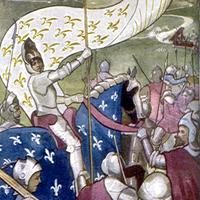20. The Third Crusade
"For all that they hold holiest, they died that died that day, And to the Holy Sepulchre their blood hath won a way." —NEALE.
Story and romance have crowned the Third Crusade, in which Frederick Barbarossa perished, with a halo of glory. It was less disastrous than the Second, forty years before, but it fell far short of the splendid results of the First Crusade.
Nevertheless the story of the lion-hearted Richard of England, and how he fought Saladin, the famous Mohammedan chief, is always worth hearing, mixed though it be with legend.
Both were brave men. If Richard was not the ideal Christian knight, he was a brave Northman, like his ancestor Rollo, with a warm zeal for the cause of Christ and a thirst for military glory. He threw his whole heart into the expedition, and alike by land and sea he knew better than any other leader how to conduct the war.
Saladin, too, was as brave as a lion. By sheer force of genius he had risen from one of the strong mountain-tribes beyond Arabia to be the greatest Mohammedan ruler of his age. Master of Egypt, Syria, and Arabia, he had included Jerusalem in his conquests. This is what roused Europe to action, and the three leading rulers of Germany, France, and England at once began preparations for marching against this powerful Eastern ruler.
Richard joined his fleet on the coast of Italy, but it was not till the spring of 1191 that he sailed from Sicily for the Holy Land, conquering the island of Cyprus and marrying a wife on the way. He found the crusaders besieging Acre, a town on the coast of Syria. The siege had lasted for two years. In the plain was gathered the crusading host, now suffering greatly from a plague that had broken out in their midst; on the heights of the city were the followers of Mohammed under the black banner of Saladin. Richard, though prostrated with fever, was overwhelmed by remorse for having loitered so long on the road.
A fiery zeal seized him. He was carried on a mattress to conduct operations. Before long Saladin sued for peace, and the banners of France and England floated from the ramparts of Acre.
But the old spirit of the crusaders was gone, and the French king now slipped home to plot against Richard, who soon found that every French and German crusader was banded against him.
The rest of the Crusade was in the hands of Richard now. The Emperor of Germany was dead. The King of France had gone home. He marched southward towards Jerusalem—the object of his goal—but he never reached the Holy City. Discords broke out, disputes took place among the leaders of the army, and, almost within sight of Jerusalem, the crusading army was obliged to turn back.
Richard himself was led to the top of a hill from which he could get a view of the Holy City. But when his guide pointed out the white buildings dimly visible in the distance, the lion-hearted king put his shield before his face, for he could not bear to see the city which he had failed to take from Saladin. So Jerusalem remained in the hands of the Mohammedans in whose hands it is still to-day.
Sadly and sorrowfully Richard sailed away from the Holy Land. As its shores slowly faded from his sight, he stretched out his arms, exclaiming, "Most holy land, may God grant me life to return and deliver thee from the yoke of the infidels." His name was feared and honoured by the Mohammedans for long after he had gone, and the Arab of Syria would exclaim to his horse when it started or pricked its ears, "Dost think it is King Richard?" But many an adventure was in store for the English king. His ship was wrecked on the coast near Venice, and he found himself wandering about in Austria, the country of his enemy, one of the leaders of the crusaders with whom he had quarrelled. For a while he wandered from place to place disguised as a pilgrim, but at last he fell into the hands of his enemy and was placed in a castle, strongly guarded, for some months. There is a story told of how, when the people of England were weeping over the disappearance of their king, his faithful minstrel set out to find his master.
One day the minstrel, Blondel, was resting outside the walls of a castle in Austria, wearied with his wanderings, when he heard the notes of an old French song, which Richard used to sing, floating on the air. Eagerly he took up the song, and then listened with beating heart. Again the voice within took up the strain, and Blondel knew he had found his master, Richard of the lion's heart. So the king returned home on the payment of a large sum of money, but he did not live to lead another Crusade into the Holy Land.

